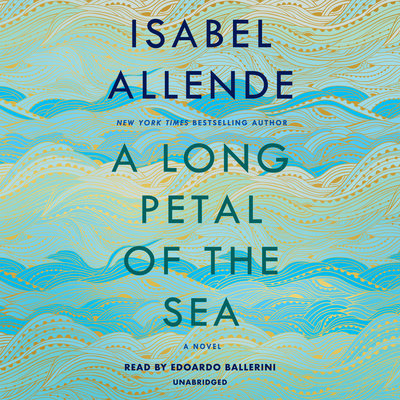Reviewed by Linda C. Brinson
A LONG PETAL OF THE SEA. By Isabel Allende. Random House Audio. Read by Edoardo Ballerini. 10 hours; 8 CDs. $40. Also available in print from Ballantine Books.

A Long Petal of the Sea, Isabel Allende’s new novel, is historical fiction at its best. It tells a remarkable story that is even more remarkable because it is so solidly grounded in real events.
For most of us in the United States, this book fills in some of the many gaps in our knowledge of our South American neighbors and what they’ve experienced.
Knowing history is important, we are told, so that we can learn from it, and this novel offers valuable insights and lessons that seem particularly appropriate for this moment in time in the United States and the world. But perhaps its message really is apt for any moment in human history, and that’s an important part of the point.
And, as historical fiction must do to keep us reading or listening, this novel also offers an engrossing story.
The story opens across the Atlantic, in Spain during the Spanish Civil War in the 1930s. As the fascists win control, those who had been fighting against their takeover flee over the mountains to France. Many die, and many of those who survive suffer in nearly unbearable conditions.
Victor Dalmau, a young Army medic, is one of the survivors. Eventually, he is reunited with Roser, a beautiful young pianist who is pregnant with his brother’s child. Not having heard from the brother in quite some time, they reluctantly conclude that he must be dead. Victor wants to help Roser and the baby she’s expecting.
Helping her becomes much more complicated when they have an opportunity for passage to a new home in Chile on a ship chartered for Spanish refugees by Pablo Neruda, the Chilean poet. If they are to be accepted into the refugee program, they must be married, so they agree to a marriage. The also agree that, while Victor intends to step into the role of the baby’s father, their marriage will be in name only.
We follow Victor and Roser, and soon, their son, as they build a good life in Chile, that “long petal of the sea” so distant from their beloved Spain – where they fully intend to return someday.
Then, in the 1970s, they find themselves cruelly caught up in the violence following the coup against Chile’s Marxist president, Salvador Allende. Eventually, they are forced into exile again, this time in Venezuela.
By the book’s end in the 1990s, they are back in Chile, and their ideas of home, what’s important and their marriage have evolved through their years together.
The weakest part of the book is the character development. Allende follows the main characters and a considerable cast of important secondary characters across more than 50 years filled with momentous developments.
In a book that’s only 336 pages in print, or about 10 hours of listening time for those who choose that option, that’s a lot to cover. As a result, much of the narrative tells us, eloquently but rather matter-of-factly, what happens with the people as well as the events swirling around them, rather than gradually developing characters and helping us to see and understand as they grow and change.
And yet, we do come away with a strong sense of Victor, Roser and others as people. We also gain admiration and, in an important way, inspiration through this story of exiles, immigrants, good people just trying to live and care for their families, who are caught up in the cruelty, greed and inhumanity that can disrupt lives, countries and, seemingly, civilization itself.
Edoardo Ballerini does a fine job of narrating the audio version of this important and enlightening story.